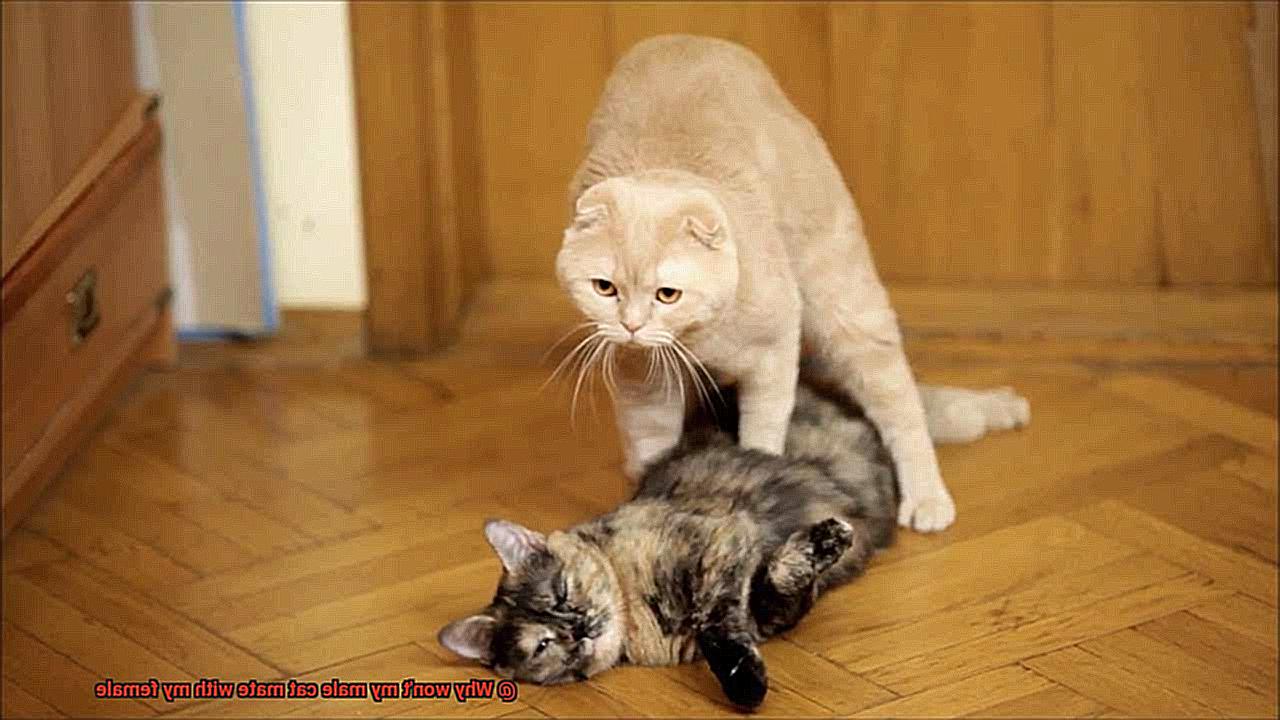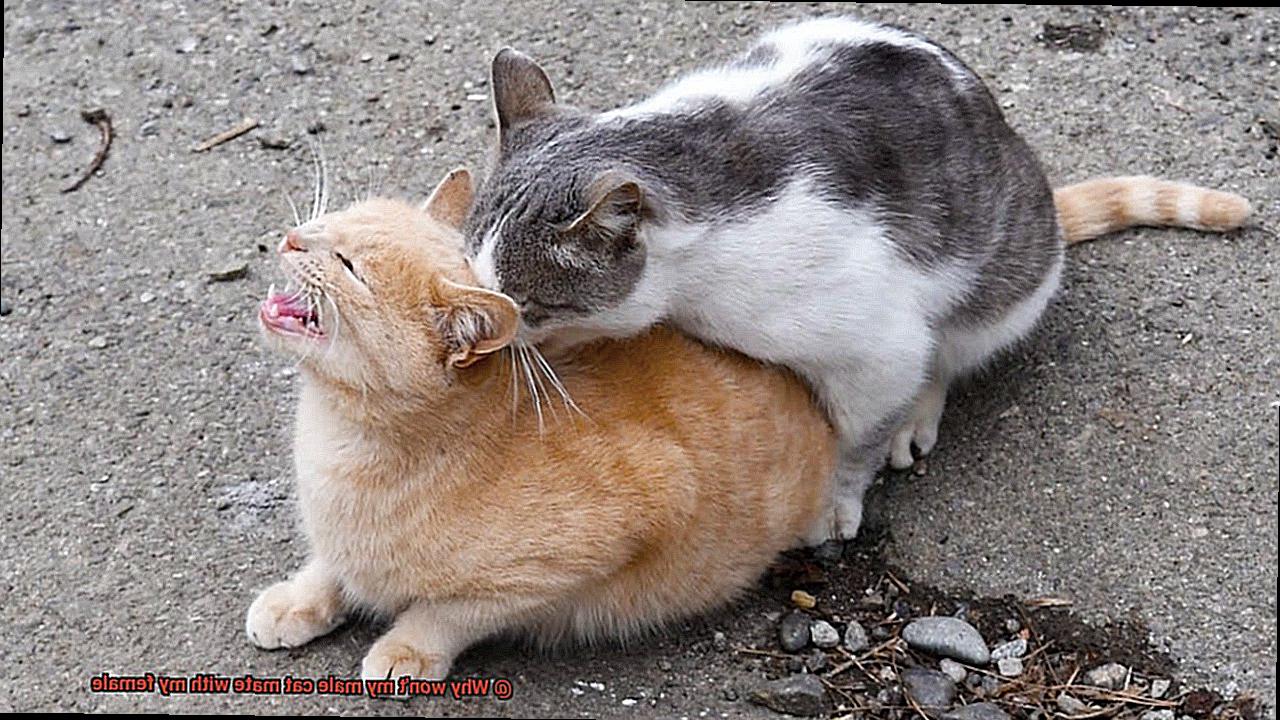Do you love cats? Are you eagerly anticipating a new batch of furry kittens from your male and female cat? Well, it might not be as straightforward as you thought. Picture this: your female cat is in heat, and you’re eagerly waiting to see some action, but your male cat seems uninterested. You might be wondering, “Why won’t my male cat mate with my female?”
Don’t worry; you’re not alone. Many cat owners face the same dilemma when their male cats refuse to mate with the females. There are various reasons why your male cat might be reluctant to copulate. It could be due to age, illness, aggression, or simply because he’s not in the mood.
In this blog post, we’ll explore the numerous reasons why your male cat might refuse to mate with your female and offer helpful tips on how to encourage them. We’ll also discuss how to tell if your cat is in heat and what to do (and not do) during this phase. Whether you’re an aspiring breeder or just curious about feline behavior, this post has everything you need to know about your male cat’s reluctance to mate with your female.
So let’s dive into the world of feline mating behavior and uncover the secrets behind why some male cats just aren’t interested in making kittens.
Reasons Why Male Cats May Not Mate with Females
There could be several reasons for this behavior. In this blog post, we will explore five different factors that could be affecting your male cat’s mating behavior.
Timing is everything
Male cats are only interested in mating when the female is in heat. If your male cat doesn’t seem interested in mating, it could simply be because the female is not yet ready to mate. So, don’t worry if your male cat isn’t showing any interest just yet.
Medical issues
Certain medical conditions such as urinary tract infections or hormonal imbalances can affect your male cat’s ability to mate. If you notice any changes in your cat’s behavior or if he seems to be in pain, it’s important to take him to the vet for a check-up.
Environmental factors
Changes in your cat’s environment can also play a role in his mating behavior. The presence of new pets or people, loud noises, or unfamiliar smells can make your male cat feel stressed or anxious, leading to a lack of interest in mating. It’s essential to create a comfortable and familiar environment for your cat.
Past experiences
If your male cat has recently mated with another female, he may not be interested in mating with another female again right away. Male cats have a strong sense of smell and can detect when a female has recently been with another male. In these cases, they may choose to avoid mating with that female as it reduces their chances of successfully reproducing.
Age
As male cats age, their sex drive may naturally decrease, making them less interested in mating with females. This is a normal part of the aging process and nothing to be concerned about.
Overall, there are several reasons why male cats may not mate with females. It’s important to monitor your cat’s behavior and seek veterinary care if you notice any changes or concerns. By addressing any underlying issues, you can help increase your male cat’s chances of successfully mating with a female. Remember, every cat is unique, and some may take longer to show interest than others.
Male Cats in Heat

Male cats in heat are quite the sight to behold. Driven by their natural instincts to find a mate and reproduce, these feline Casanovas can exhibit a range of behaviors, from increased vocalization to spraying urine to mark their territory. However, just because your male cat is showing signs of being in heat, it doesn’t necessarily mean that he will mate with a female.
There are several reasons why a male cat may refuse to engage in amorous activities. Firstly, if your male cat is not sexually mature yet, which usually happens around six months of age, attempting to mate them before that time will likely be unsuccessful. Additionally, if your cat is experiencing any medical issues that affect their reproductive capabilities, they may not be able to mate with a female.
Another reason why your male cat may not want to mate with a female is that he may not be attracted to her. Just like humans, cats can have preferences for certain types of mates based on scent or physical characteristics. It’s also possible that the female is not receptive to the male’s advances or is already pregnant.
It’s crucial to understand that forcing a male cat to mate with a female can lead to stress and harm for both animals. Instead, if you’re experiencing difficulty getting your male cat to mate with your female, it’s best to consult with a veterinarian or animal behaviorist for guidance on how to proceed.
Compatibility Issues Between Cats

While this can be frustrating, there are several potential compatibility issues between cats that can put a damper on their romantic pursuits.

One of the primary factors that can hinder cats from mating is their unique personalities and preferences, which can clash with other cats in the household. Introducing a new cat to the household should be done gradually, allowing them time to adjust to each other’s presence. Furthermore, if there are already multiple cats in the household, it’s critical to ensure they all have their space and resources. Separate litter boxes, food bowls, and beds for each cat can help to reduce territorial behavior and minimize tension.
Dominance issues also play a significant role in preventing cats from mating. If one cat is more dominant than the other, they may not allow the other cat to mate. This dominance issue can also lead to aggression towards each other, further complicating the situation. It’s essential to work on establishing a hierarchy between cats and creating a peaceful environment for all of them.
Finally, some cats may just not be interested in mating due to their personalities or past experiences. In such cases, it’s critical to respect your cat’s boundaries and avoid forcing them into any uncomfortable situations. To prevent any unwanted mating behavior and reduce health risks, spaying and neutering your cats is also essential.
Stress and Anxiety in Male Cats
Stress and anxiety could be the culprits behind this change in behavior. Stress can cause a decrease in a cat’s libido, which results in a general loss of interest in mating. This stress can be caused by various factors, including changes in the environment or the presence of other animals. To help reduce stress levels, it’s essential to create a peaceful and comfortable environment for your cats and establish a hierarchy between them.
Anxiety can also play a significant role in your male cat’s mating behavior. If your cat feels threatened or anxious around a female, he may avoid mating altogether. This anxiety can stem from past negative experiences with other cats or unfamiliar surroundings. As responsible pet owners, we need to recognize the signs of stress and anxiety in our male cats and take steps to alleviate these issues.
To reduce stress and anxiety levels for our feline friends, we must provide a calm environment for our cats and ensure they have adequate socialization and interaction with humans and other animals. Cats are social creatures, and they need to feel comfortable in their environment to thrive. If stress and anxiety levels are severe, it may be necessary to seek the advice of a veterinarian or animal behaviorist to develop a plan for managing these issues. This plan may involve medication or behavioral therapy to help your cat cope with stress and anxiety.
Physical Health Issues in Male Cats
In some cases, physical health issues can impact a male cat’s sexual behavior, causing them to be uninterested in mating with a female. Let’s explore some of the physical health issues that could be affecting your male cat’s sexual behavior.
Urinary tract infections (UTIs) are a common issue that can cause pain and discomfort during urination, making male cats reluctant to mate. UTIs can also lead to inflammation of the prostate gland, causing pain and discomfort in the genital area. Obesity is another physical health issue that can hinder mating behavior, as overweight male cats may find it challenging to mount and engage in sexual activity due to decreased agility and mobility.
Hormonal imbalances are another factor that can affect a male cat’s libido. Testosterone levels play a crucial role in a male cat’s sexual behavior. Any disruption in these levels can lead to decreased libido or sexual dysfunction. Medical conditions such as hypothyroidism or hyperthyroidism can disrupt testosterone levels, leading to reduced sexual activity.
Physical abnormalities or injuries can also impact a male cat’s ability to mate successfully. For instance, if a male cat has suffered an injury to his genital area or has a congenital defect that affects his reproductive organs, he may be unable to mate with a female.
MnJvenRF858″ >
Conclusion
In conclusion, there are numerous factors that could be preventing your male cat from showing interest in mating with your female. These include timing, medical concerns, environmental factors, past experiences, age, personality clashes or dominance issues between cats, as well as stress and anxiety levels.
As a responsible pet owner, it’s crucial to keep a close eye on your cat’s behavior and seek veterinary care if you notice any changes or concerns. Forcing a male cat to mate can be harmful for both animals, so it’s important to consult with a veterinarian or animal behaviorist for guidance on how to proceed.
It’s worth remembering that every cat is unique and may take longer than others to show interest. However, creating a peaceful and comfortable environment for your cats can help reduce stress and anxiety levels. Adequate socialization and interaction with humans and other animals can also alleviate these issues.
If physical health issues are affecting your male cat’s sexual behavior, seeking veterinary care for proper diagnosis and treatment is essential. By understanding the reasons behind your male cat’s reluctance to mate with your female and providing appropriate care and support, you can increase your chances of having adorable kittens in no time.
In summary, patience is key when it comes to feline reproduction.







